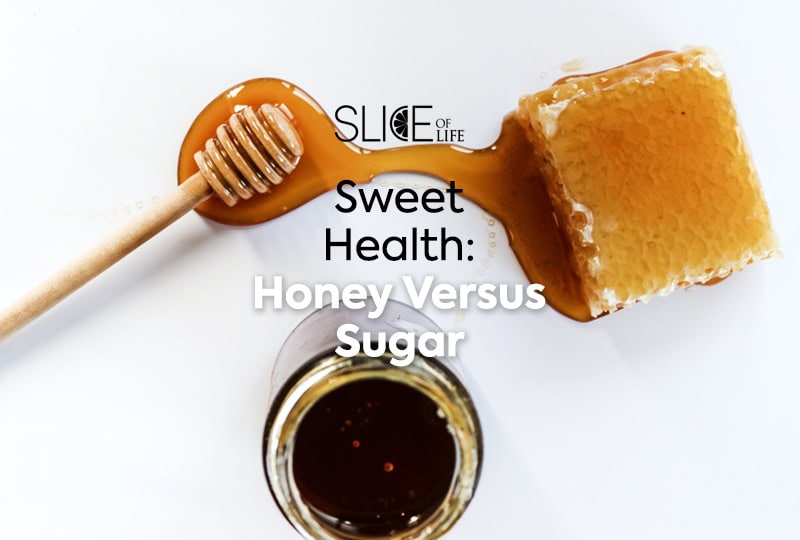The question of whether honey is healthier than sugar is a complex one and depends on various factors. Let’s break down the information provided:
Honey Benefits:
- Nutrient Content: Honey does contain small amounts of vitamins and minerals, such as calcium, iron and potassium, which refined sugar lacks. These nutrients can be beneficial in small quantities.
- Antioxidants: Some types of honey, like buckwheat honey, are rich in antioxidants, which can help protect cells from damage caused by free radicals.
- Potential Health Benefits: Honey has been associated with certain health benefits, including relieving coughs, providing a quick source of energy for athletes, acting as an antibiotic for wound healing and having prebiotic potential for gut health.
According to EatingWell.com, there are over 300 variety types of honey available in the United States.
They list the five most popular types of honey as follows.
- Acacia honey is light in color and flavor with lightly fruity-floral notes.
- Buckwheat honey is not as sweet and is darker in color than other varieties, but has been proven to be rich in antioxidants.
- Clover is one of the most popular varieties of honey, with a light and sweet flavor and a strong floral aroma.
- Manuka honey boasts antiviral, antibacterial, antioxidant and anti-inflammatory properties. It is said to be effective in clearing a sore throat, preventing tooth decay, treating skin blemishes, healing wounds and more.
- Wildflower honey can vary in flavor and color from season to season because the bees have gathered nectar from multiple flower sources. Malibu Honey founder and owner Bruce Lampcov says, “[We] collect wildflower honey from the Santa Monica and San Gabriel Mountains. The wildflowers that produce nectar vary depending on the season. Lupine, sage and buckwheat are among the most prominent in our honey.”
They also shared the different types of sugar.
- Granulated: When you hear “sugar,” this is probably what you’ll think of. It is a multipurpose sugar that is highly refined and most commonly used in cooking and baking.
- Cane: Minimally processed and produced solely from sugar cane, cane sugar has a darker color and slightly larger grain than granulated sugar. It also typically has a higher price tag.
- Powdered: Also known as confectioners’ sugar, powdered sugar has been ground down to a fine powder and has a small amount of cornstarch added in to prevent clumping. It dissolves in liquid easily and is ideal for making homemade frosting or icing.
- Light brown: Similar in appearance to your classic granulated white sugar, light brown sugar has a small amount of molasses in it, which gives it a light brown color and more intense taste.
- Dark brown: Dark brown sugar gives a richer flavor to recipes and has a higher concentration of molasses than light brown sugar.
Sugar (Granulated) Benefits:
- Fast Source of Energy: Sugar provides a fast source of glucose, which can be quickly utilized by the body for energy.
Concerns for Both Honey and Sugar:
- Caloric Content: Honey does contain slightly more calories than sugar, but this difference is relatively small.
- Moderation: Both honey and sugar should be consumed in moderation. Excessive sugar intake has been linked to obesity, cardiovascular disease, type 2 diabetes and dental cavities.
Specific Concerns:
- Honey: It’s important to note that honey can pose risks for certain individuals. Babies under the age of six months should not consume honey due to the risk of infant botulism. People with bee allergies should also avoid honey, as it could trigger an allergic reaction (anaphylaxis).
Bottom Line: The comparison between honey and sugar is not straightforward. While honey does offer some potential health benefits and contains small amounts of nutrients, it’s important to remember that it’s still a form of sugar and should be used in moderation. The choice between honey and sugar can depend on personal preferences, dietary restrictions, and the specific culinary or medicinal application.
If you’re looking to reduce your sugar intake, using alternatives like stevia, erythritol or monk fruit sweeteners may be worth considering. Ultimately, a balanced diet that limits added sugars is key to maintaining overall health.
A great resource for healthy eating is Life U’s Nutrition Program, At Life University, our nutrition program upholds the vitalistic vision of the University through a sustainability-focused curriculum. It is based on mindful decision-making practices related to food and its preparation, which respect and heal individuals, food systems and the earth. For more information, go to life.edu/academic-pages/Bachelor-of-Science-in-Nutrition.
Slice of LIFE is an invitation to and extension of everything happening at Life University. Whether you are a current student, a potential freshman or a proud alum, Slice of LIFE can help keep you connected to your academic community. Know of a compelling Life U story to be shared, such as a riveting project, innovative group or something similar? Let us know by emailing Marketing@life.edu.


Social Media